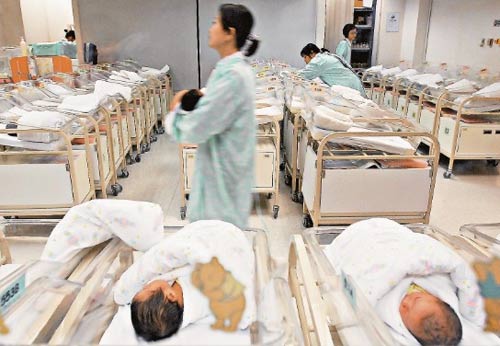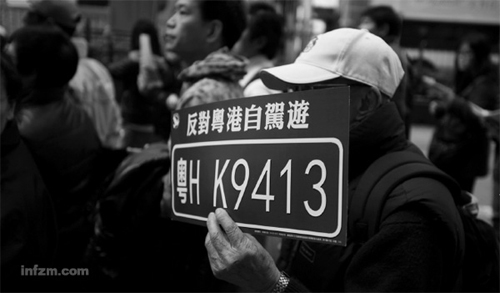
The growing number of cross-border births is straining Hong Kong's healthcare resources.

Local Hong Kongers oppose the government proposal to open up the border to mainland Chinese drivers and their vehicles.
(Ecns.cn)--Despite local benefits wrought by the booming economy of the Chinese mainland, some Hong Kongers bear considerable resentment against their neighbors to the north, as the city's resources are being stretched to the limit due to the ever-growing presence of mainland Chinese, pointed out the Southern Weekend.
Attracted by Hong Kong passports--which allow more freedom to live, work and travel--millions of mainland tourists and investors pour into the city every year. They add billions of dollars to the local economy, but also fuel property prices and take up limited hospital space, particularly in maternity wards which struggle to care for tens of thousands of mainland mothers-to-be.
Of the 88,000 births in Hong Kong in 2010, roughly 45 percent were delivered by mainland Chinese women, according to the Hong Kong government.
The growing number of cross-border births is not just straining healthcare resources and the local population's goodwill--it has also provoked an identity crisis that 15 years after the handover has alienated local residents from their northern neighbors.
A recent poll carried out by a University of Hong Kong professor showed that the number of Hong Kong residents who identify themselves as Chinese citizens (as opposed to Hong Kong citizens or a mix of both) has fallen to 16.6 percent, a 12-year low. Three years ago, 38.6 percent of Hong Kong residents considered themselves Chinese citizens, reported The Wall Street Journal (WSJ).
"I'm angry because they (mainlanders) are invading us," Sun Wong, an 18-year-old student, told the newspaper. "They're having their kids here, taking welfare and benefits while not paying taxes or contributing anything."
Adding fuel to the fire is a recent series of tense confrontations between locals and mainlanders.
Earlier in January, Italian luxury goods maker Dolce & Gabbana was heavily condemned when security guards banned locals from taking pictures at the brand's flagship store, but allowed mainlanders to keep snapping. A campaign on Facebook days later galvanized more than a thousand people to protest outside the shop, forcing it to shut early, said the WSJ.
About a week later, a heated dispute broke out on the Hong Kong subway, where a mainland girl was asked by a local man to stop eating and drinking on the train—a practice prohibited in the city. The incident happened to be captured by cell phone video and became a sensation online soon after.
Tensions were further inflamed by comments from Kong Qingdong, a controversial professor at Peking University, who when shown the video of the subway dispute, called the Hong Kong residents "running dogs of the British imperialists," according to an online report by NBC News.
In response, a group of concerned Hong Kong citizens bought a full-page ad in a popular mainstream Chinese-language Hong Kong daily newspaper that called mainland visitors "locusts"—a term referring to the large numbers overrunning the city and consuming all of its resources.
Furthermore, instead of giving credit to the mainland for helping Hong Kong survive major crises such as the financial crisis in 1997 and the SARS epidemic in 2003, many Hong Kongers instead attribute the success at such difficult moments to local governments.
Lei Dingming, an economist at the Hong Kong University of Science and Technology, released a report in January this year, suggesting that inbound tourism has contributed 3 percent to the local GDP and created jobs for nearly 70,000 people, but the contribution is limited since most of the jobs are at low-tech, labor-intensive companies.
Now, Hong Kong residents are calling for an end to what they say is an "invasion" from the mainland, commented the WSJ.
Dr. Elaine Chan of the Center of Civil Society and Governance at Hong Kong University told NBC News that the tension is "a manifestation of something deeper。"
"Hong Kong people do not have a very positive view of mainlanders," she said, arguing that there is an underlying sensitivity to and awareness of the fact that Hong Kong is bound up with China—culturally, historically, politically and economically—and yet, there remains a gap in fundamental values, such as the rule of law.
As a "special administrative region" within China, Hong Kong largely runs its own affairs under the "one country, two systems" formula enunciated by Deng Xiaoping, China's late paramount leader. It has its own legal system and currency, issues its own travel documents and allows free speech and other liberties unknown in the rest of China, explained The Washington Post.

Copyright ©1999-2011 Chinanews.com. All rights reserved.
Reproduction in whole or in part without permission is prohibited.